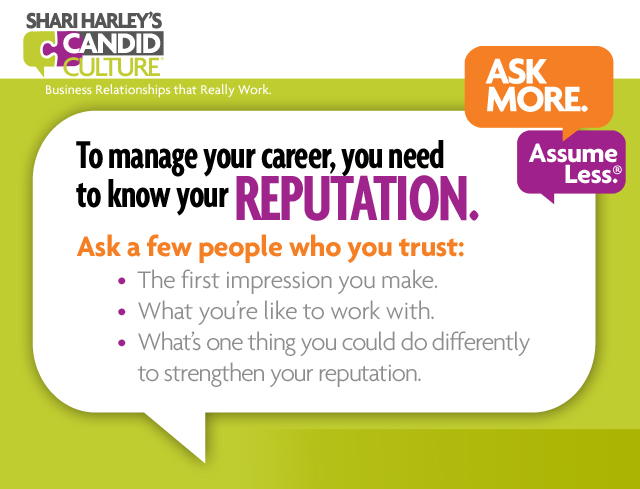 Unfortunately you probably already know that people have a tendency to talk about you, not to you. It’s human nature. Sometimes it’s gossip. Other times senior leaders talk about your future with the organization. If you want to advance your career, you need to know what the people whose opinions you care about say about you when you’re not there.
Unfortunately you probably already know that people have a tendency to talk about you, not to you. It’s human nature. Sometimes it’s gossip. Other times senior leaders talk about your future with the organization. If you want to advance your career, you need to know what the people whose opinions you care about say about you when you’re not there.
Unfortunately most people get very little feedback at work. If today was the day of your performance appraisal and I asked how your boss and whoever else provides input on your review would rate you, you probably don’t know. This lack of knowledge prevents you from advancing your career.
Not knowing someone’s opinion doesn’t mean you’re not subject to it. Akin to getting a speeding ticket when you didn’t know you were speeding. The cop doesn’t care. He adds four points to your driving record, despite that you didn’t know the speed limit.
You may work for a manager who gives feedback. You may not. It doesn’t matter. There are people in your life who will tell you the truth (as they see it), if you ask.
I recommend assembling a core group of people who you count on to tell you the truth. These are the people who know you well and have your back. They can be friends, family members, past coworkers, customers, or managers.
You might wonder, “What can my mom or friends from high school or college tell me about how I behave at work?” The answer–a lot.
We don’t become different people when we arrive at work. We are who we are. If you’re often late, break commitments, or wear clothing that’s not your friend, you do those things at home and at work. Likewise, if you have great attention to detail, never break commitments, and always look great (in public), you friends and family know.
Identify a few people, personal and/or professional, who care about you and will tell you the truth.
Tell these folks you want to eliminate your blind spots. Ask them for specific feedback, and promise that no matter what they say and how hard it is to hear, you will say “thank you.” Then be sure to manage yourself. It’s normal to become defensive when we get constructive feedback. But every time we become defensive, we train people it’s not safe to tell us the truth. If you want people to give you feedback, more than once, make it easy to tell you the truth.
You may be thinking that asking for feedback is unrealistic. People won’t be honest. And you can’t take it.
The people who really care about you will be honest, and you can take it. You’ll be fine. In fact you’ll be better off than before you had the conversations. You might hear things that pleasantly surprise you. And the things you don’t like? Just because no one talked to you about them before you asked, doesn’t mean those behaviors didn’t impact you. Now you can do something about them.
Get out of the dark and into control. Discover your reputation and advance your career.
 When the people we work with don’t do their jobs, we might find ourselves saying, “He should be more on top of things.” “She shouldn’t make commitments she can’t keep.” “He doesn’t know what he’s doing, and that’s not my problem.” The challenge is, when your coworkers don’t perform, it is your problem.
When the people we work with don’t do their jobs, we might find ourselves saying, “He should be more on top of things.” “She shouldn’t make commitments she can’t keep.” “He doesn’t know what he’s doing, and that’s not my problem.” The challenge is, when your coworkers don’t perform, it is your problem.
When your coworkers don’t get you the information you need in a timely way, you miss deadlines. When you work from incorrect information, your reports are wrong. When others don’t work with you, you look bad. So you can be right all day about how others perform, and your reputation will still be negatively impacted.
I don’t suggest you enable your coworkers by doing the work others don’t. I do suggest you help your coworkers be successful by holding them accountable.
Here are a few things you can do to manage your career and get what you need from your business relationships:
- Don’t assume others will meet deadlines. Check in periodically and ask, “What’s been done so far with the XYX project?” Notice, I didn’t suggest asking, “How are things going with the XYZ project.” “How are things going” is a greeting, not a question.
- Set iterative deadlines. If March 20th is your drop dead deadline, ask to see pieces of work incrementally. “Can I see the results of the survey on March 5th, the write up on March 10th, and the draft report on March 15th?” One of the biggest mistakes managers and project managers make is not practicing good delegation by setting iterative deadlines and reviewing work as it’s completed.
- Don’t just email and ask for updates. The people you work with are overwhelmed with email. And email is too passive. Visit people’s offices or pick up the phone. Saying, “I emailed him and haven’t heard back” makes you look as bad as the other person who missed a deadline.
You might be thinking, “Holding my coworkers accountable is awkward. I don’t have the formal authority, and I don’t want my coworkers to think I’m bossy or damage my business relationships.”
It’s all in the how you make requests.
If you’ve seen me speak or have read the business book How to Say Anything to Anyone, you know I believe in setting clear expectations at the beginning of anything new. That could sound something like, “I’m looking forward to working with you on the XYZ project. How would you feel if we set iterative deadlines, so we can discuss work as it is completed? You’ll get just-in-time input, making any necessary adjustments as we go, and we’ll stay ahead of schedule. How does that sound? How are the 5th, 10th, and 15th as mini deadlines for you?”
Many people put large projects off until the last minute. People procrastinate less when large projects are broken into smaller chunks with correlating deadlines. You strengthen your business relationships and support people in meeting deadlines and not procrastinating when you agree on completion dates when projects begin. Also, most of us unfortunately know what it’s like to put a lot of work into a project, have someone review our completed work, and then be told we went down the wrong path and need to start over. It’s days like this that make being a Walmart greeter seem appealing.
Ask more. Assume less. Don’t assume your coworkers will do what they’re supposed to do. Ask upfront to see pieces of work on agreed upon dates. Pick up the phone versus rely on email to communication. And know that the people you work closely with are a reflection of you. Strengthen your business relationships. Get people working with you, and everyone will look good.
 Unfortunately you probably already know that people have a tendency to talk about you, not to you. It’s human nature. Sometimes it’s gossip. Other times senior leaders talk about your future with the organization. If you want to advance your career, you need to know what the people whose opinions you care about say about you when you’re not there.
Unfortunately you probably already know that people have a tendency to talk about you, not to you. It’s human nature. Sometimes it’s gossip. Other times senior leaders talk about your future with the organization. If you want to advance your career, you need to know what the people whose opinions you care about say about you when you’re not there.


